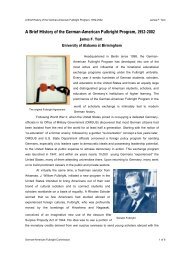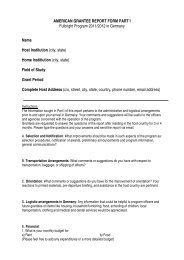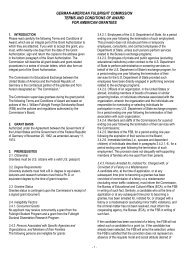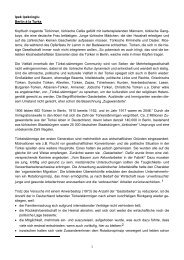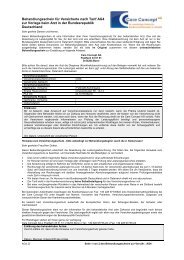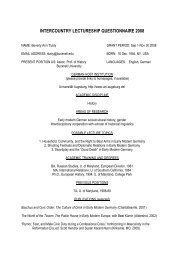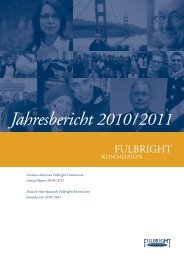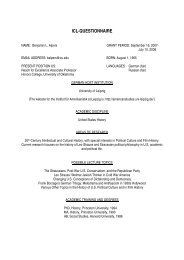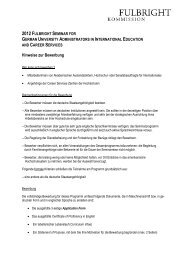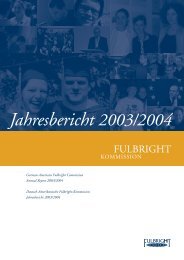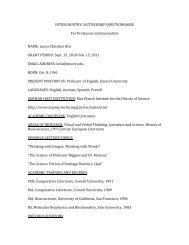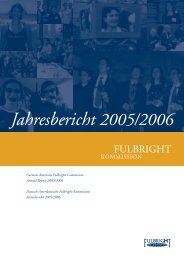The First Class of Fulbrighters - Fulbright-Kommission
The First Class of Fulbrighters - Fulbright-Kommission
The First Class of Fulbrighters - Fulbright-Kommission
Create successful ePaper yourself
Turn your PDF publications into a flip-book with our unique Google optimized e-Paper software.
Delbert Barley, 1989<br />
Delbert Barley was born in Froid, Montana, in 1918 and then moved to Minnesota. He<br />
received his B.A. from McPherson College in Kansas, 1935-39, and did post-graduate work at<br />
Iowa State Teachers College, 1939-40. During WWII, Barley served as a smoke jumper in<br />
Montana, and between 1946-48 he worked for Quakerhilfe in Danzig, Paris, and Freiburg.<br />
Barley finished his graduate studies at the University <strong>of</strong> Pennsylvania, 1949-52, and lectured<br />
at St. Joseph’s College and Muhlenburg College before his <strong>Fulbright</strong> year near Freiburg in<br />
1953-54. In 1955 Barley became an Assistant Pr<strong>of</strong>essor <strong>of</strong> Sociology at Ithaca College, NY,<br />
where he was then awarded his Ph.D. He was a pr<strong>of</strong>essor for sociology and political education at<br />
the Evang. Seminar/Fachhochschule für Sozialarbeit, Freiburg, 1958-83; and an Associate<br />
Pr<strong>of</strong>essor <strong>of</strong> Sociology at State University <strong>of</strong> New York at Geneseo, 1966-67. Since his retirement<br />
in 1983 Barley has lived in Vaucluse (Provence) and Waldbronn, Germany.<br />
somehow not regarded as “real” expellees, and, as a matter <strong>of</strong><br />
fact, they had left more or less under cover <strong>of</strong> retreating German<br />
troops, not literally driven from their homes. I met up<br />
with a saying widely known in southern Germany: “Bis man<br />
Wurst gesagt hat, hat der Preus’ sie schon gegessen.” 2 Little love<br />
was lost for strangers from the North and East; they were all<br />
Prussians.<br />
IN BETWEEN INTERVIEWS, there were occasional<br />
trips by bus to Freiburg, skiing <strong>of</strong> an unpr<strong>of</strong>essional sort, a<br />
bit <strong>of</strong> practice on the cello I had brought with me and making<br />
music together with my wife and the wife <strong>of</strong> a teacher in<br />
a nearby village. <strong>The</strong> couple lived in a tiny settlement with a<br />
less tiny sawmill in a valley within walking distance from<br />
St. Märgen. <strong>The</strong> teacher, who presided over the one-room<br />
school, was a singer, a natural scientist, and a most interesting<br />
character. We <strong>of</strong>ten enjoyed our visits with them, and<br />
the hike to and from the village.<br />
Christmas was celebrated in the strict family traditional<br />
form. A large Tannenbaum was erected in one <strong>of</strong> the rooms,<br />
decorated, and the Christmas gifts were arranged secretly by<br />
our host. Each <strong>of</strong> the children <strong>of</strong> the host and Barley families<br />
had a pile <strong>of</strong> packages. Christmas songs were sung, our host<br />
accompanied on the guitar. It was solemn and impressive.<br />
Sometime in late winter my wife and I went to Loccum<br />
(Lower Saxony) to an Evangelische Akademie, where the integration<br />
<strong>of</strong> expellees and refugees was being discussed. Dr.<br />
Elisabeth Pfeil, a well-known sociologist, whose name was<br />
familiar to me through her publications, was one <strong>of</strong> the<br />
speakers. We heard her talk and were able to meet her. (Several<br />
years later we invited her to speak at a Jubiläum-Year<br />
celebration at the Seminar in Freiburg; she accepted, and<br />
also accepted a personal invitation from us.) At the same<br />
time, we came in contact with someone from Espelkamp<br />
(Westfalia), a post-war settlement made up exclusively <strong>of</strong><br />
expellees and refugees. In Espelkamp was also an Aufbaugymnasium<br />
for youth that had been unable to complete their<br />
Abitur due to flight, primarily from the GDR. Since we were<br />
pondering what we would do after the <strong>Fulbright</strong> year was<br />
finished, the idea <strong>of</strong> a teaching position in the Gymnasium or<br />
in the area presented itself.<br />
After returning to St. Märgen from Loccum we pursued<br />
the idea again <strong>of</strong> a position in Espelkamp. As a result we<br />
moved to that settlement in May (1954). Our living quarters<br />
consisted <strong>of</strong> a single room in<br />
the dormitory complex; we<br />
ate in the common dining<br />
hall. We came into contact<br />
with the director <strong>of</strong> the Gymnasium,<br />
and came to know a<br />
number <strong>of</strong> students, some <strong>of</strong><br />
whom had had dramatic<br />
experiences with the GDR<br />
authorities, including imprisonment<br />
in Bautzen. 3<br />
Although my wife was a<br />
qualified teacher and might<br />
very well have gotten a position,<br />
it was important that I<br />
return to Penn, complete<br />
my dissertation and get my<br />
Ph.D. before making any<br />
26 27<br />
Barley and his wife ski near their home<br />
in St. Märgen.<br />
final decisions that could block the way. It was a time <strong>of</strong><br />
indecision. Memorable about Espelkamp is the night during<br />
which a man, probably drunk, approached our open window<br />
at ground level and put his hands on the window sill in<br />
preparation for entering. My wife heard something and<br />
awakened me. <strong>The</strong> man could not see me, but I could clearly<br />
see the contours <strong>of</strong> his head. I drew back in the dark, lurched<br />
forward with all my strength and punched him in the face.<br />
He fell grunting to the ground, picked himself up slowly,<br />
and waddled away. When we told students about it the next<br />
morning they wanted to know why I hadn’t gone out and<br />
pursue him!<br />
I returned to the U.S. on the United States in July 1954<br />
in order to secure a position and a place to dwell. My wife<br />
and the two children followed in December. All went well<br />
and I received the Ph.D. with my dissertation: “<strong>The</strong> Integration<br />
<strong>of</strong> Refugees and Expellees in a Rural Black Forest Community.”<br />
Apart from libraries, it is to be seen in the<br />
Stadtarchiv in Freiburg. <strong>The</strong> <strong>Fulbright</strong> year was an important<br />
key to my pr<strong>of</strong>essional life.<br />
1) Roughly equivalent to a township 2) By the time you’ve said sausage, the<br />
Prussian has already eaten it 3) A former East German prison, where many<br />
political prisoners were kept.



